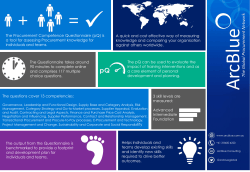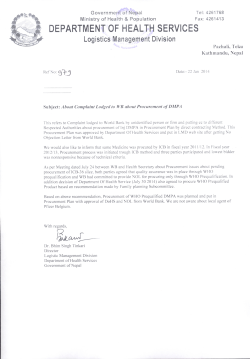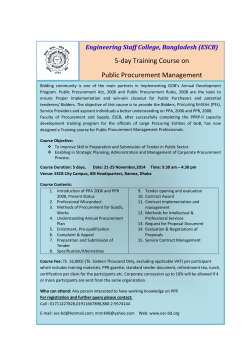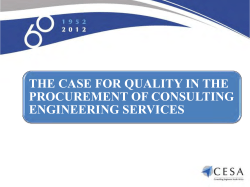
Fighting back against global procurement fraud
Fighting back against global procurement fraud With the growth of global sourcing, procurement fraud has become a worldwide issue. But with differing domestic laws – and contrasting cultural attitudes towards issues such as business ethics – managing these risks can be a legal and commercial minefield. Laws such as the UK Bribery Act and the US Foreign Corrupt Practices Act put the onus on companies to ensure they adhere to UK/US laws even when doing business abroad. But what is the situation on the ground – how are other nations fighting procurement fraud? A global risk “Procurement fraud is recognised as a global risk within certain countries like the US, which created the International Contract Corruption Task Force and the National Procurement Fraud Task Force as far back as 2006,” says Paul Guile, CIPS fellow and its global procurement fraud adviser. “In 2011, in the UK, the National Fraud Authority established the procurement fraud project which highlighted procurement fraud as a risk to UK public sector of approximately £2.3bn.” The African nations have joined the fight against procurement fraud and recognised the risks of corruption within the procurement process. Kenya highlights procurement fraud as a risk in the Public Procurement and Disposal Act 2005, and puts in specific sections to combat this. Zambia also mentioned fraud in procurement in the 2012 Anti-Corruption Act. “In 2011, in South Africa, procurement fraud was highlighted as such a risk that the National Treasury created a multi-action working group to combat bribery and corruption in the supply chain,” says Guile. Does this mean that procurement fraud is increasing across Africa and globally? No-one really knows. We do know that fraud is under-reported globally and often procurement fraud can occur for extended periods of time without being identified. The increase in reported procurement fraud cases could be explained by the fact that countries are getting better at identifying procurement fraud as a risk. One thing is for certain: the more procurement fraud is highlighted as a risk and staff are trained in how to identify it, the more likely it will be prevented in other areas. There is also positive action being taken over breaches in procurement policies. Last month Liberian president Ellen Johnson Sirleaf dismissed two public officials in charge of procurement and auditing [link to http://www.supplymanagement.com/news/2013/liberian-president-sacks-officials-over-procurementbreaches/] for failing to follow financial management and procurement laws. Leading global excellence in procurement and supply New horizons The Middle East and North Africa (MENA) is a region where procurement has only recently begun to flex its muscles in the area of fraud, bribery and corruption. CIPS fellow Sam Achampong, based in Dubai, says this makes it difficult to accurately assess the impact of procurement fraud. “In the Middle East region procurement is a relatively new discipline. Rules and best practices are not yet fully embedded so it is difficult to gauge the level of inappropriate procurement activity,” he says. “In many cases, gift logs and other formal procedures are not in place, so it is then difficult to penalise practitioners for contravening a process that does not exist. For this reason, specific occurrences of alleged procurement fraud are largely anecdotal.” “Overall it is clear that more formality is needed in the region to protect both companies and their employees from the inference of fraud, and many multinational organisations in the region have, or are in the process of addressing this need, which has been further highlighted by a number of recent high-profile financial fraud cases,” he adds. The attitude towards these issues is changing, particularly as global organisations expand into the region. Paul Guile added: “The MENA region has recognised the risk of corruption at the highest levels and will no doubt benefit from the introduction of the National Anti-Corruption Commission 2011 and the new federal law to combat bribery. It is hoped these initiatives will have an impact on procurement fraud reduction.” In an effort to support the objectives of global corruption commissions and to assist in the development of anti-procurement fraud best practice worldwide, CIPS recently launched the first global online anti-procurement-fraud training course. The e-learning package will help both private and public sector organisations to identify the red flags and risks of procurement fraud and implement best practice prevention, detection and mitigation. For more information please email procurementfraud@cips.org V3.0 valid from 01 Aug 2013 2
© Copyright 2025








